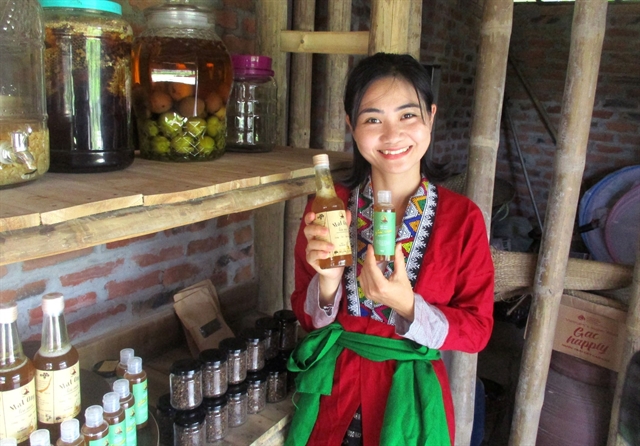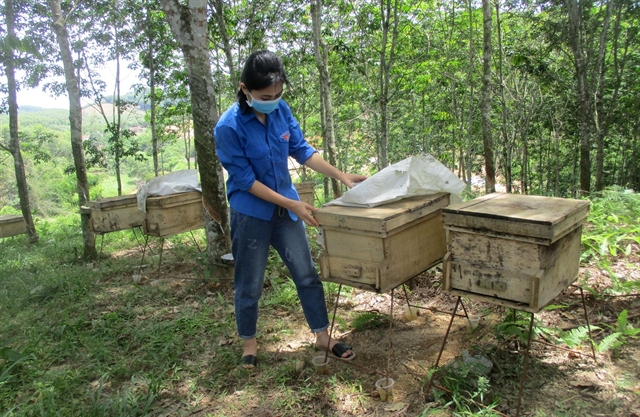 Society
Society


|
| Nguyễn Lê Ngọc Linh and her forest garden honey products. — VNA/VNS Photo |
THANH HÓA — In the far-flung reaches of Thanh Hóa Province, where dry hills stretch across the land, a quiet revolution is taking root. Leading it is 34-year-old Nguyễn Lê Ngọc Linh, a woman from the Thổ ethnic group, who walked away from a promising career in the city to reforest degraded land and re-imagine sustainable livelihoods for her community.
What began as a dream has grown into Vườn rừng bản Thổ (Thổ Village Forest Garden), a pioneering agro-ecology initiative covering over six hectares. The initiative has brought verdant life back to barren hills and changed how rural development is approached.
From PR pro to forest restorer
Born in the district of Như Xuân, Linh knew firsthand the challenges facing her community: poor soil, deforestation, and a lack of economic opportunity. After graduating from a university in Hà Nội with a degree in public relations, Linh landed a coveted role at a major publishing company.
Yet something tugged at her. Each visit home reminded her of the vanishing forest and the people left behind.
In 2020, she made the improbable choice to leave the city and invest her savings, nearly US$39,000, into a three-hectare barren hillside with no access to electricity, water or roads.
Family and friends called it a mistake. But Linh saw something different: the potential to heal the land and the people.
Rewilding through local wisdom
Unlike monoculture forestry projects, 'Vườn rừng bản Thổ' is an agro-ecological marvel designed to mimic a natural forest ecosystem. Linh planted multi-layered vegetation: fruit trees, medicinal herbs, native timber species, and nitrogen-fixing plants. The goal was to rebuild biodiversity and let nature guide the regeneration process.
No synthetic fertilisers, pesticides or herbicides are used. Instead, composted organic matter and biofertilisers produced on-site nourish the soil. Grasses are not uprooted, but are left to protect against erosion and water loss — a critical approach in this erosion-prone landscape.
"Như Xuân is an arid region with little rain. If the land is not well covered, it will easily lose water, leading to soil degradation," Linh explained, noting that more than 100 species thrive in her forest-farm system today.
Cooperative model for community prosperity
Recognising that personal action was not enough, Linh founded Hợp tác xã Bản Thổ (the Thổ Village Cooperative) in late 2020. Starting with just seven members, it now includes over 20, mainly ethnic minority women from impoverished households. They share land, tools, knowledge and profits.
Through the cooperative, Linh introduced value-added processing to the local economy. Her standout product — fermented forest honey infused with herbs like ginger and turmeric — has earned a three-star OCOP certification, Việt Nam’s national standard for rural products.

|
| Nguyễn Lê Ngọc Linh inspects beehives in the forest garden. — VNA/VNS Photo |
The cooperative’s reach has expanded beyond the province. Products are sold online via websites, distributed through regional fairs, and shared on social media — all skills Linh carried over from her previous career in media.
Reviving more than the land
The social impact is tangible. Dozens of villagers now have stable incomes. Women previously confined to household labour are earning money, gaining confidence, and taking leadership roles within the cooperative. Linh also trains locals in sustainable farming, often hosting students and volunteers from across Việt Nam.
"Thanks to working here, I have a stable monthly income of VNĐ5 million ($193) and have learned about afforestation, plant protection, and not using chemical fertilisers," said Trương Thị Hiền, a local worker.
National recognition and growing ambitions
Her work has earned national acclaim. In 2020, she won the Special Prize at the National Rural Youth Start-up Contest. In 2021, her honey product topped Thanh Hóa’s Innovation Awards. In 2022, she received the prestigious Lương Định Của Award for outstanding young farmers.
The following year, she was awarded the Vừ A Dính Prize, recognising ethnic minority youth for contributions to community development.
Her long-term vision? A complete sustainable food ecosystem rooted in the forest. She plans to expand into community-based tourism, showcasing local Thổ culture through craft workshops, traditional foods and eco-lodging, as well as scale up organic production with new forest plots in the neighbouring Ngọc Lặc District.
"I don't just sell honey; I sell the story behind it, a story about the forest," Linh stated, emphasising her role as a storyteller connecting values.
Reforestation, climate adaptation and indigenous pride
Beyond economic success, Linh’s model has become an environmental case study. Her reforestation has improved groundwater retention and soil fertility.
Trees once absent from the region are now attracting birds and insects, boosting pollination and wildlife diversity.
Perhaps more critically, the forest serves as a cultural anchor for the Thổ people, reconnecting them with their roots through medicinal plants, ancestral stories, and traditional land-use practices.
"If there are no more forests, our world will have nothing left," Linh said. — VNS




